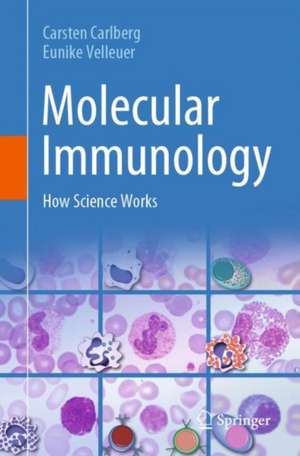Molecular Immunology: How Science Works
Autor Carsten Carlberg, Eunike Velleueren Limba Engleză Paperback – 28 mai 2022
This textbook aims to describe in a condensed form the essentials of molecular immunology behind bacterial infections, the microbiome, viral infections (such as influenza and COVID-19), organ transplantations, autoimmunity, allergy and tumor immunology. The book emphasizes the impact of immunology in maintaining our health and preventing disease. Our immune system protects us not only from severe consequences of infectious diseases and getting cancer, but is also able to harm us severely via sepsis, cytokine storms and anaphylactic shocks. Molecular understanding of immunology should allow the reader a more rational handling of common diseases, most of which are associated with chronic inflammation.
Preț: 415.14 lei
Preț vechi: 436.99 lei
-5% Nou
Puncte Express: 623
Preț estimativ în valută:
79.43€ • 83.16$ • 65.73£
79.43€ • 83.16$ • 65.73£
Carte disponibilă
Livrare economică 15-29 martie
Livrare express 04-08 martie pentru 33.92 lei
Preluare comenzi: 021 569.72.76
Specificații
ISBN-13: 9783031040245
ISBN-10: 3031040244
Pagini: 219
Ilustrații: XV, 219 p. 94 illus., 93 illus. in color.
Dimensiuni: 155 x 235 x 15 mm
Greutate: 0.45 kg
Ediția:1st ed. 2022
Editura: Springer International Publishing
Colecția Springer
Locul publicării:Cham, Switzerland
ISBN-10: 3031040244
Pagini: 219
Ilustrații: XV, 219 p. 94 illus., 93 illus. in color.
Dimensiuni: 155 x 235 x 15 mm
Greutate: 0.45 kg
Ediția:1st ed. 2022
Editura: Springer International Publishing
Colecția Springer
Locul publicării:Cham, Switzerland
Cuprins
1 Cells and tissues of the immune system.- 2 Innate immunity and inflammation.- 3 Adaptive immunity and antigen receptor diversity.- 4 B cell immunity: BCRs, antibodies and their effector functions.- 5 Antigen-presenting cells and the major histocompatibility complex.- 6 T cell immunity: TCRs and their effector functions.- 7 Immunity to bacterial pathogens and the microbiome.- 8 Immunity to viral pathogens and the virome.- 9 Tolerance and transplantation immunology.- 10 Immunological hypersensitivities: Allergy and autoimmunity.- 11 Cancer immunology.
Notă biografică
Carsten Carlberg graduated 1989 with a PhD in biochemistry at the Free University Berlin (Germany). After positions as postdoc at Roche (Basel, Switzerland), group leader at the University of Geneva (Switzerland) and docent at the University of Düsseldorf (Germany) he is since 2000 full professor of biochemistry at the University of Eastern Finland in Kuopio (Finland). His work focuses on mechanisms of gene regulation by nuclear hormones, in particular on vitamin D. At present Prof. Carlberg focuses projects on epigenome-wide effects of vitamin D on the human immune system in the context of cancer.
Eunike Velleuer graduated 2006 as MD at the University of Düsseldorf (Germany) and specialized in 2016 in pediatric hemato-oncology. At present, she serves as senior physician at the Helios Children’s Clinic Krefeld as well as a research associate at the University of Düsseldorf. Her special clinical focus is the cancer predisposition syndrome Fanconi anemia. Herein, her research interest is early detection and prevention of oral squamous cell carcinoma and identifying patients with Fanconi anemia at risk. Furthermore, Dr. Velleuer is interested in increasing patients resilience and find alternative ways for long-lasting empowerment.
Textul de pe ultima copertă
This textbook aims to describe in a condensed form the essentials of molecular immunology behind bacterial infections, the microbiome, viral infections (such as influenza and COVID-19), organ transplantations, autoimmunity, allergy and tumor immunology. The book emphasizes the impact of immunology in maintaining our health and preventing disease. Our immune system protects us not only from severe consequences of infectious diseases and getting cancer, but is also able to harm us severely via sepsis, cytokine storms and anaphylactic shocks. Molecular understanding of immunology should allow the reader a more rational handling of common diseases, most of which are associated with chronic inflammation.
Caracteristici
Based of 15 years teaching experience on the topic Provides in a condensed form an overview on the present understanding of molecular immunology Combining basic biology with clinical examples
